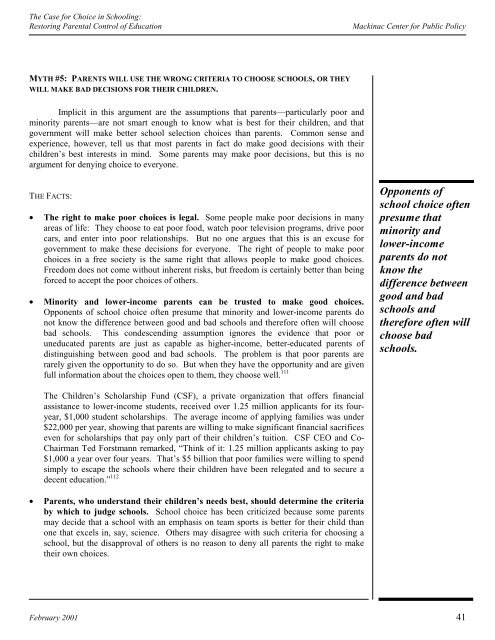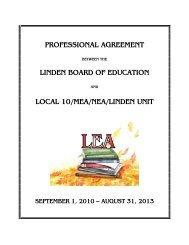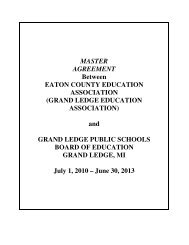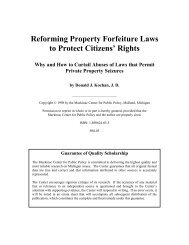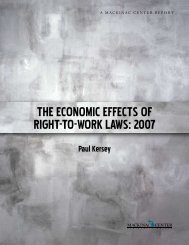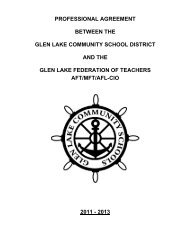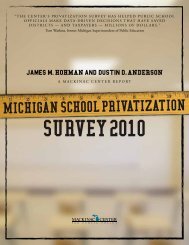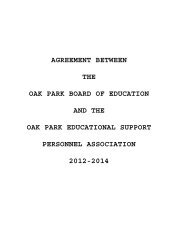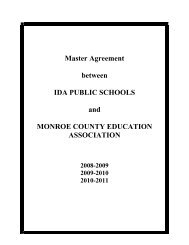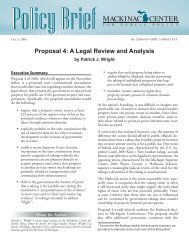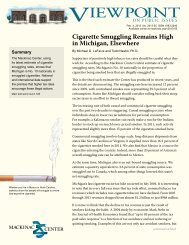The Case for Choice in Schooling - Mackinac Center
The Case for Choice in Schooling - Mackinac Center
The Case for Choice in Schooling - Mackinac Center
- No tags were found...
Create successful ePaper yourself
Turn your PDF publications into a flip-book with our unique Google optimized e-Paper software.
<strong>The</strong> <strong>Case</strong> <strong>for</strong> <strong>Choice</strong> <strong>in</strong> School<strong>in</strong>g:Restor<strong>in</strong>g Parental Control of EducationMack<strong>in</strong>ac <strong>Center</strong> <strong>for</strong> Public PolicyMYTH #5: PARENTS WILL USE THE WRONG CRITERIA TO CHOOSE SCHOOLS, OR THEYWILL MAKE BAD DECISIONS FOR THEIR CHILDREN.Implicit <strong>in</strong> this argument are the assumptions that parents—particularly poor andm<strong>in</strong>ority parents—are not smart enough to know what is best <strong>for</strong> their children, and thatgovernment will make better school selection choices than parents. Common sense andexperience, however, tell us that most parents <strong>in</strong> fact do make good decisions with theirchildren’s best <strong>in</strong>terests <strong>in</strong> m<strong>in</strong>d. Some parents may make poor decisions, but this is noargument <strong>for</strong> deny<strong>in</strong>g choice to everyone.THE FACTS:• <strong>The</strong> right to make poor choices is legal. Some people make poor decisions <strong>in</strong> manyareas of life: <strong>The</strong>y choose to eat poor food, watch poor television programs, drive poorcars, and enter <strong>in</strong>to poor relationships. But no one argues that this is an excuse <strong>for</strong>government to make these decisions <strong>for</strong> everyone. <strong>The</strong> right of people to make poorchoices <strong>in</strong> a free society is the same right that allows people to make good choices.Freedom does not come without <strong>in</strong>herent risks, but freedom is certa<strong>in</strong>ly better than be<strong>in</strong>g<strong>for</strong>ced to accept the poor choices of others.• M<strong>in</strong>ority and lower-<strong>in</strong>come parents can be trusted to make good choices.Opponents of school choice often presume that m<strong>in</strong>ority and lower-<strong>in</strong>come parents donot know the difference between good and bad schools and there<strong>for</strong>e often will choosebad schools. This condescend<strong>in</strong>g assumption ignores the evidence that poor oruneducated parents are just as capable as higher-<strong>in</strong>come, better-educated parents ofdist<strong>in</strong>guish<strong>in</strong>g between good and bad schools. <strong>The</strong> problem is that poor parents arerarely given the opportunity to do so. But when they have the opportunity and are givenfull <strong>in</strong><strong>for</strong>mation about the choices open to them, they choose well. 111Opponents ofschool choice oftenpresume thatm<strong>in</strong>ority andlower-<strong>in</strong>comeparents do notknow thedifference betweengood and badschools andthere<strong>for</strong>e often willchoose badschools.<strong>The</strong> Children’s Scholarship Fund (CSF), a private organization that offers f<strong>in</strong>ancialassistance to lower-<strong>in</strong>come students, received over 1.25 million applicants <strong>for</strong> its fouryear,$1,000 student scholarships. <strong>The</strong> average <strong>in</strong>come of apply<strong>in</strong>g families was under$22,000 per year, show<strong>in</strong>g that parents are will<strong>in</strong>g to make significant f<strong>in</strong>ancial sacrificeseven <strong>for</strong> scholarships that pay only part of their children’s tuition. CSF CEO and Co-Chairman Ted Forstmann remarked, “Th<strong>in</strong>k of it: 1.25 million applicants ask<strong>in</strong>g to pay$1,000 a year over four years. That’s $5 billion that poor families were will<strong>in</strong>g to spendsimply to escape the schools where their children have been relegated and to secure adecent education.” 112• Parents, who understand their children’s needs best, should determ<strong>in</strong>e the criteriaby which to judge schools. School choice has been criticized because some parentsmay decide that a school with an emphasis on team sports is better <strong>for</strong> their child thanone that excels <strong>in</strong>, say, science. Others may disagree with such criteria <strong>for</strong> choos<strong>in</strong>g aschool, but the disapproval of others is no reason to deny all parents the right to maketheir own choices.February 2001 41


